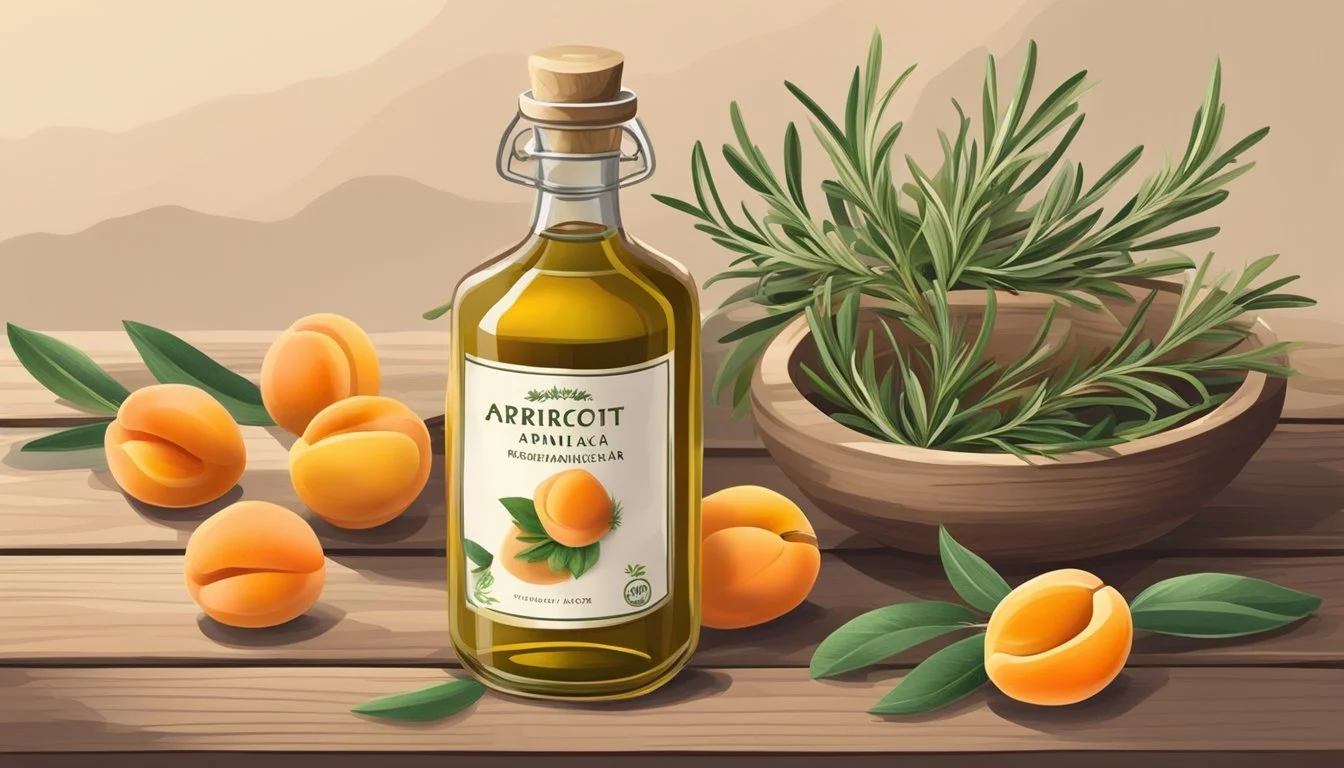Apricot Vinegar Substitutes
Top Alternatives for Your Recipes
Apricot vinegar, characterized by its fruity undertone and sweet yet tart flavor profile, serves as a delightful addition to many recipes. It imparts a distinct apricot essence that can enhance the taste of salads, marinades, and glazes. Apricot vinegar's unique taste, however, might not always be readily available or suitable for every palate or dietary requirement, necessitating suitable substitutes that can closely mimic or complement its flavor.
Substituting apricot vinegar requires ingredients that offer a balance between sweetness and acidity. Fruit vinegars, like apple cider vinegar, provide a similar fruit-based tang and can be sweetened with a touch of sugar or honey to better match the mild sweetness of apricot vinegar. Lemon or lime juice, though more citric, can also be used to achieve a comparable zesty flavor when combined with a sweet component in dressings and sauces.
A confident approach to finding a stand-in for apricot vinegar involves considering the desired result in the dish. Flavor compatibility is key; mild white wine vinegar can serve as a base for a substitute when combined with apricot preserves or a hint of apricot juice to infuse the necessary fruit notes. These alternatives allow cooks to maintain the integrity of their dishes, ensuring that the absence of apricot vinegar does not compromise the intended taste experience.
Understanding Vinegar and Its Role in Cooking
Vinegar imparts distinctive flavor and acidity to dishes, crucial for balance and preservation. Its role extends beyond these, with various types offering unique benefits to recipes.
Types of Vinegar
Different vinegars come from diverse sources and fermentation processes, resulting in varying flavors and acidity levels. Common types include:
Apple Cider Vinegar: Made from fermented apple cider, this type offers a mild apple flavor suitable for dressings and marinades.
Balsamic Vinegar: Aged and complex, it adds a sweet-tart profile to glazes and reductions.
White Vinegar: Known for its sharpness, it’s often used in pickling and cleaning.
Wine Vinegars: Red and white wine vinegars provide a more nuanced taste for sauces and vinaigrettes.
Fruit Vinegars: Such as apricot vinegar, these carry a fruit-forward essence and are often less harshly acidic.
The Importance of Acidity in Dishes
Acidity in vinegar doesn't just influence flavor; it serves several roles in cooking:
Taste: It can brighten and sharpen flavors, offering a counterpoint to sweetness, salt, and fat.
Preservation: The acidic nature inhibits the growth of harmful bacteria, making vinegar a key component in preserving foods.
Health Benefits: Vinegar may have health benefits, such as supporting digestive health due to the presence of acetic acid.
Tenderizing: Acidity can break down proteins in meat, making it a useful tenderizing agent.
When using vinegar, one should consider both the desired flavor profile and the interaction its acidity will have with other ingredients.
Apricot Vinegar and Its Unique Profile
Apricot vinegar, known for its sweet and fruity flavor, stands out in gastronomy. This vinegar not only adds a distinct taste to dishes but also brings a nutritional boost, offering fiber, vitamins A and C among others.
Flavor Characteristics of Apricot Vinegar
Apricot vinegar carries a notably sweet and fruity flavor, recognized for its ability to infuse dishes with a bright, tangy note. Unlike more pungent vinegars, its milder profile makes it versatile in the culinary world, pairing well with both savory and sweet dishes. It marries the essence of ripe apricots with the acidic zing of traditional vinegar, creating a balance that can enhance dressings, marinades, and glazes.
Nutritional Profile of Apricot Vinegar
Nutritionally, apricot vinegar is appreciated for more than its taste. It contains dietary fiber, which aids in digestion, and it's a source of essential vitamins. Notably, it provides vitamins A and C, which are important for maintaining good skin health and immune function, respectively. The use of apricot vinegar in cooking not only adds a delightful flavor but also contributes to a balanced diet.
Selecting Substitutes for Apricot Vinegar
When choosing a substitute for apricot vinegar, one must consider flavor compatibility and the impact on overall texture. The goal is to find a vinegar substitute that provides a similar balance of sweetness and tartness.
Criteria for Choosing Apricot Vinegar Substitutes
The selection of an appropriate substitute hinges on two primary factors: flavor and texture. A good substitute should emulate the fruity, mildly tangy profile of apricot vinegar, and possess a comparable viscosity to ensure consistency in recipes.
Flavor: Match the sweet and tart notes.
Texture: Aim for a similar liquid consistency to avoid altering the recipe's mouthfeel.
Common Vinegar Substitutes
Several vinegars can serve as substitutes for apricot vinegar, each bringing a unique flavor profile that can complement different dishes. Below is a brief list of alternatives:
Apple Cider Vinegar: Offering a milder taste with a hint of apple, it stands as the most versatile option.
Substitution: Equal parts substitution works well in most recipes.
White Wine Vinegar: Its light and tangy flavor makes it suitable for dressings and mild sauces.
Substitution: Direct 1:1 replacement to maintain the intended taste.
Balsamic Vinegar: Known for its bold flavor, it may be used sparingly.
Substitution: To mimic apricot vinegar's lighter essence, mix 1 tablespoon balsamic vinegar with ½ teaspoon sugar.
It's important to tailor the choice of vinegar to the specific needs of the dish, considering how each vinegar's distinctive taste and sharpness can influence the overall outcome.
Fruit-Based Substitutes for Apricot Vinegar
When seeking substitutes for apricot vinegar, one can explore various fruit-based options that offer a similar balance of sweetness and acidity to recipes. These alternatives not only maintain the intended flavor profiles but also contribute their own unique characteristics.
Lemon Juice and Other Citrus
Lemon juice is a readily available substitute that imparts a bright acidity, which can mimic the tangy aspect of apricot vinegar. For a well-rounded flavor, one can mix lemon juice with a bit of sugar to achieve the sweetness reminiscent of apricot vinegar. Similarly, orange juice, with its citrusy sweetness, can be a fresh, zesty replacement.
Mix 1 tablespoon of lemon juice with 1/2 teaspoon of sugar as a starting point for substituting an equal amount of apricot vinegar.
Alternative Fruit Vinegars
Vinegars made from other fruits can stand in for apricot vinegar while maintaining the fruitiness required in certain dishes. Apple cider vinegar offers a mild fruitiness along with its tartness. For a sweeter profile, peach vinegar or mango vinegar might be used, especially in dressings and marinades where their subtle fruit flavors can shine through.
Start with a 1:1 substitution ratio and adjust according to taste preferences.
Fruit Juices as Substitutes
Fruit juices, diluted with a bit of vinegar to introduce some needed acidity, can serve as excellent substitutes for apricot vinegar. Peach nectar or apricot nectar provide a similar sweetness and fruit-forward flavor. In contrast, mango juice can offer a tropical twist, while apple juice brings a milder sweetness.
Combine 3 parts fruit juice to 1 part white vinegar for a substitution that balances sweetness with the acidic bite of vinegar.
Sweet Substitutes for Apricot Vinegar
When seeking to replace apricot vinegar, one must consider the balance of sweetness and acidity it brings to a dish. Sweet substitutes can mimic the sugary profile of apricot vinegar while other ingredients may be used to adjust the tartness separately.
Natural Sweeteners
Honey: A natural sweetener, honey brings a rich, floral sweetness that can complement dishes in place of apricot vinegar. Its viscosity and depth of flavor make it a favorable choice for marinades and glazes.
Sugar: Regular granulated sugar is the most straightforward substitute. It dissolves easily and provides a clean, neutral sweetness. For a flavor closer to apricot vinegar, one can use brown sugar, which has a slight molasses note.
Syrups
Maple Syrup: With its distinctive warm flavor, maple syrup can serve as a sweet substitute, providing a complexity similar to that of apricot vinegar. Ideal for dressings or sauces, its consistency also works well in cooked recipes.
Agave Syrup: Agave is sweeter than sugar but less viscous than honey, offering a mild, sweet flavor with a hint of caramel. Due to its plant-based origin, it is a popular choice for vegan cooking.
Adapting Recipes with Vinegar Substitutes
When a recipe calls for apricot vinegar and none is at hand, there are several other vinegars and ingredients that can be used as substitutes. These alternatives can impart a similar fruity acidity to dishes, ensuring the end result remains delicious.
Sauces and Salad Dressings
For salad dressings and sauces where apricot vinegar is specified, a balance of sweet and tart flavors is essential. A suitable substitute is white balsamic vinegar, which offers a milder taste with a touch of sweetness. One can also opt for champagne vinegar or sherry vinegar, each adding a unique flavor profile to the dressing.
Substitution Ratio: Use equal parts of the substitute vinegar for apricot vinegar.
To Retain Sweetness: Add a pinch of sugar if desired, to mimic the fruitiness of apricot vinegar.
Baking and Desserts
In baked goods and desserts, the moisture and acidity that apricot vinegar provides can be replicated by using alternatives like apple cider vinegar. It imparts a fruit-forward flavor that complements sweet dishes well.
For Every 1 Tablespoon of Apricot Vinegar: Use 1 tablespoon of apple cider vinegar plus ½ teaspoon of sugar to achieve a comparable sweetness.
Marinades and Glazes
Marinades and glazes benefit greatly from the acidity and sweetness of apricot vinegar. When substituting, combine cider vinegar or red wine vinegar with a small amount of sugar to approximate the original ingredient's flavor.
Substitute Proportion: Mix 1 tablespoon of the chosen vinegar with ½ teaspoon of sugar for every tablespoon of apricot vinegar called for.
Flavor Consideration: Adjust the amount of sugar based on the natural sweetness of the fruit or ingredients present in the recipe.
Health and Dietary Considerations
When considering apricot vinegar substitutes, it's important to assess health effects related to allergies, nutritional content, and dietary restrictions. Substitutes can vary widely in protein, calories, carbohydrates, and fiber content, as well as their allergenic potential.
Allergies and Food Sensitivities
For individuals with fruit allergies, particularly stone fruits, apricot vinegar may pose a risk. Substitutes such as distilled white vinegar or apple cider vinegar are typically considered less allergenic. These alternatives also offer various health benefits, including the presence of antioxidants. It’s crucial for consumers to familiarize themselves with the ingredients of any substitute to avoid allergic reactions.
Apple Cider Vinegar: Antioxidants, with a lower allergenic potential
Distilled White Vinegar: A neutral option, less likely to cause sensitivity
Vegan Substitutes
Vegans seeking to replace apricot vinegar should ensure that the substitute fits within their plant-based dietary framework. Both balsamic vinegar and red wine vinegar are vegan-friendly and can impart a flavor depth similar to apricot vinegar while also providing some health benefits.
Balsamic Vinegar: Rich in antioxidants and offers a sweet flavor
Red Wine Vinegar: Contains resveratrol, a compound known for its health-promoting properties
Each substitute has its unique nutritional profile; however, vinegars are generally low in calories and carbohydrates, and they do not contain protein or fibers. When substituting vinegars for apricot vinegar, one can expect a minor impact on the overall nutritional value of the dish. The primary dietary consideration is ensuring that the substitute aligns with health needs and dietary restrictions.
Worldwide Vinegar Varieties
Exploring the world of vinegars reveals a vast spectrum of flavors and uses that vary by region. These acidic liquids play a crucial role in culinary practices, with certain types tied deeply to the food culture of their origin countries.
European Vinegars
European vinegars are diverse and often tied to specific regions known for their unique culinary heritage. In Italy, Balsamic vinegar is a staple, especially in the Modena region, where it is aged and crafted with deep, complex flavors. Balsamic vinegar is not a derivative of stone fruit but is made from grape must.
Moving to France, wine vinegars, such as those made from red and white wines, are popular. They have a sharp taste that suits the French cuisine, known for its subtlety and depth. Notably, sherry vinegar, originating from Spain, carries a nutty and dried fruit palate, which though not stone fruit-derived, complements stone fruit dishes well.
Asian Vinegars
Asian vinegars present a different palette of flavors. China is known for its Chinkiang vinegar, a black rice vinegar with a malty, smoky profile. This vinegar is integral to many Chinese dishes and demonstrates the versatility of vinegar beyond just a sour condiment.
Rice vinegar is common across many Asian countries offering a milder flavor compared to most Western vinegars. It is an essential ingredient for sushi rice and various marinades. While not commonly made from stone fruits, its mild acidity can be a suitable substitute in recipes calling for the fruitier apricot vinegar, especially when a subtle tartness is required.
Conclusion
When exploring substitutes for apricot vinegar, the goal is to approximate its unique sweet and tangy profile while maintaining the integrity of the dish it's used in. Common vinegar alternatives offer various flavor notes that can complement the intended recipe.
Key Points to Remember:
Flavor Match: Choose a substitute that mirrors the sweet-tartness of apricot vinegar.
Acidity Levels: Ensure the alternative possesses a similar acidic presence to maintain balance.
Availability: Opt for more readily available options to ensure ease in recipe adaptation.
Table of Substitutes:
Substitute Profile Suitability Apple Cider Vinegar Fruity and mildly acidic Salads, marinades White Wine Vinegar Sharp and less sweet Sauces, reductions Rice Vinegar Mild and slightly sweet Asian-inspired dishes Balsamic Vinegar Complex, sweet, and rich Glazes, dressings Lemon/Lime Juice High acidity and bright citrus notes Seafood, vegetables
In conclusion, there are several viable substitutes for apricot vinegar. They should opt for an alternative that best complements the primary flavors of the dish they are preparing, ensuring a harmonious result. The bottom line is to select a vinegar or acidic component that offers a similar profile or can be modified slightly to achieve the desired outcome while keeping the structural purpose of the vinegar in the recipe.









